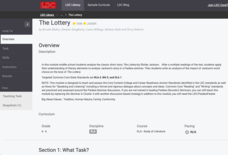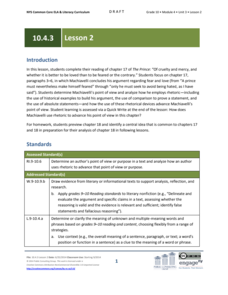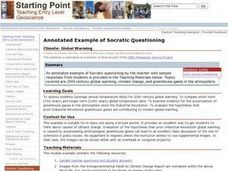Curated OER
Body Biography: The Lion, the Witch and the Wardrobe
Class groups assume the identity of one of the primary human characters in The Lion, the Witch and the Wardrobe. They create a body biography that identifies the most important traits of their character, translate these traits into...
Curated OER
East Asian Fiction and Non-Fiction Books
Readers explore East Asian culture and literature with a book folder project. Before beginning the project, learners record three beliefs they have about East Asian culture. They then select two books to read and create a display for the...
Curated OER
Telling Your Story
Have young writers compose stories that add detail to the moments captured in personal photographs and create an annotated photo album. Rather than sending every member of the class home for the weekend with a digital camera, you might...
EngageNY
Grade 9 ELA Module 1: Unit 3, Lesson 20
The final session in this 20-lesson plan unit asks individuals to use their Quick Writes, discussion notes, worksheets, and annotated text to craft and support a claim about how Shakespeare develops either Romeo or Juliet as tragic heroes.
EngageNY
Grade 9 ELA Module 2, Unit 2, Lesson 10
The slow curse of realization begins to sink in during the tenth lesson in a literary analysis unit on Sophocles' Oedipus the King. Ninth graders carefully read the selected lines for evidence of Oedipus' feelings during a turning point...
EngageNY
Grade 9 ELA Module 2, Unit 2, Lesson 19
Now that readers can see the full scope of Sophocles' Oedipus the King, they can draw connections between the dramatic ending and the textual evidence throughout the Greek tragedy. As they prepare for the unit assessment writing prompt,...
EngageNY
Grade 9 ELA Module 3, Unit 1, Lesson 9
Keeping animals relaxed and comfortable has numerous benefits. Explore Temple Grandin's unique perspective on animal behavior with a lesson that concentrates on a central idea within the text. High schoolers prepare for the final...
EngageNY
Grade 9 ELA Module 3, Unit 1, Lesson 10
Finish your unit on Temple Grandin's Animals in Translation with a two-part written assessment. As ninth graders refer to their notes, annotations, and discussion guides from the first part of the unit, they prepare for a writing prompt...
EngageNY
Grade 9 ELA Module 3, Unit 2, Lesson 7
Now that learners have honed their inquiry-based projects down to their strongest few questions, they can conduct independent research. High schoolers pursue answers to their inquiries while assessing sources, establishing a research...
Chicago Teachers Union Quest Center
Factored Form of a Quadratic Function
Build upon linear functions to learn about quadratics. The lesson introduces the concept of zeros for quadratic functions and makes the connection to the linear factors of the function. It presents quadratics in both graphical and...
EngageNY
Grade 9 ELA Module 4, Unit 1, Lesson 23
In "How We Researched and Wrote this Book," the final essay in Sugar Changed the World: A Story of Magic, Spice, Slavery, Freedom, and Science, authors Aronson and Budhos discuss their research methods and purpose in writing the text....
College Board
Reading—Central Idea and Evidence
Young readers become experts at finding the central idea in informational text with an educational resource. The resource includes helpful tips to annotating close passages to succeed on the actual SAT exam, as well as strategies to make...
Literacy Design Collaborative
The Lottery
Shirley Jackson's short story "The Lottery" provides middle schoolers with an opportunity to hone their close reading and literary analysis skills. After annotating their copy of the story, writer's craft an essay in which they analyze...
EngageNY
Grade 10 ELA Module 4: Unit 3, Lesson 2
How do rhetorical devices advance an author's point of view? Scholars consider this question as they continue exploring Machiavelli's The Prince. They work in small groups, annotating the text for evidence of rhetoric before engaging in...
Literacy Design Collaborative
Rhetorical Analysis: A Modest Proposal
Scholars read Jonathan Swift's A Modest Proposal before writing essays to analyze the use of rhetorical devices in the text. Essay writing begins by underlining key words in the writing prompt and discussing the prompt with partners....
EngageNY
Tracing the Idea of Fish Depletion: Chapter 1
Would you, could you? Scholars read World without Fish and focus carefully on the use of the words could and would. They chunk the text into smaller sections and write annotations on sticky notes to help with comprehension. To finish,...
EngageNY
Mid-Unit Assessment: Analyzing Idea Development in Chapter 3 of World without Fish
Half way there. Scholars work on the mid unit assessment for World without Fish. Learners work independently to complete the assessment. They then answer text-dependent questions and use sticky notes for annotating.
EngageNY
Mid-Unit Assessment: Analyzing Point of View and Plot Development in Flush
It's the halfway point—there's no turning back now. Scholars work on the mid unit assessment for Flush. For the assessment, learners analyze the point of view and plot development by annotating the text using sticky notes and underlining...
K20 LEARN
Oklahoma and Segregation
It was not just the states of the Deep South that practiced segregation. Young historians investigate the history of segregation and desegregation in Oklahoma. They begin by reading, annotating, and analyzing an article about the impacts...
Academy of American Poets
Teach This Poem: "A New National Anthem" by Ada Limón
Ada Limon's poem, "A New National Anthem," offers young scholars an opportunity to reflect on the significance of the US national anthem and the extent to which Key's vision applies to all Americans. After watching a video of Whitney...
Curated OER
Travels With Charley By John Steinbeck
A paragraph from John Steinbeck's Travels with Charley provides English language learners with an opportunity to practice strategies for answering guiding questions about the academic text. Class members locate keywords in the annotated...
K20 LEARN
The Sirens: Is It a Bird or Is It a Fish?
Fish, fowl, foul fish, or foul fowl? Just what is a siren? Young scholars listen to a video clip and draw what they imagine when they hear the word "siren." After watching several videos depicting sirens, class members read "The Sirens'...
Curated OER
Annotated Example of Socratic Questioning: Climate: Global Warming
High schoolers compare and discuss short-term and longer-term global temperature data. They evaluate data from three sets of graphs and then participate in a structured whole class Socratic discussion on the possible causes of climate...
Curated OER
Annotated, Detailed Example of Socratic Questioning
Students identify and define the main components of the hydrosphere and the ways in which they interact with one another. They explore how changes in Earth's surface materials affect components of the hydrosphere and evaluate the effect...

























